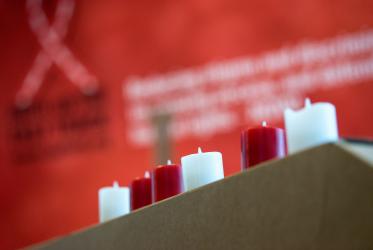By Albin Hillert*
Taking place on 4-8 September in Kampala, Uganda, a World Council of Churches (WCC) and UNAIDS regional consultation on HIV Treatment Adherence and Faith Healing in Africa has gathered to address issues of “faith-healing only” practices in the context of HIV and AIDS. At the core is the question of how religious leaders can partner with governmental organizations nationally and internationally, as well as with other parts of civil society to develop strategies to advocate for HIV treatment adherence, and to build bridges to those among faith-healing only practitioners who are open to dialogue.
In recent years, the phenomenon of “faith-healing only” has been highlighted as having an impact on treatment adherence in medication of HIV. At the heart of the issue lies an upsurge in faith communities preaching deliverance from all illnesses, including HIV, by faith-healing alone, thus inspiring people living with HIV to stop taking their anti-retroviral drugs in the hopes that they will be cured by faith-healing only.
The issue of “faith-healing only” surfaced at two national interfaith consultations in Kenya and Zambia which were organized by the WCC Ecumenical HIV and AIDS Initiatives and Advocacy (EHAIA) in October 2016 as part of PEPFAR-UNAIDS Faith Initiative, and was highlighted as needing urgent attention by churches regarding HIV treatment adherence. Similarly a recent PEPFAR-UNAIDS Faith Initiative consultation on early diagnosis and treatment of HIV-positive children held in Abuja, Nigeria, found that negative impact of “faith healing only” on HIV treatment adherence is emerging as a critical reality.
Against this background, the Uganda consultation sets out to identify, describe, and strengthen the contributions of religious leaders in support of HIV treatment adherence, and to challenge harmful approaches to faith healing.
Agents of change
Rev. Pauline Wanjiru Njiru, eastern Africa regional coordinator for the WCC-EHAIA explains, “Gathering here in Kampala, I hope that religious leaders can come together, to say that we are in support of treatment, and that we encourage our people living with HIV to seek medicine, faithfully. There is a lot of progress that has been made in the context of HIV treatment, and we need to encourage people to make use also of the scientific gains, and not be deceived by faith-healing only messages.”
“My hope is that people at this consultation will engage honestly about the experiences of faith healing,” Wanjiru added, “and that those of us who propagate the faith-healing only can also see the light of day, realize that faith does stand in contradiction with science, and that faith-healing only messages can actually endanger people’s lives.”
Archbishop Stanley Ntagali of the Church of Uganda, opened the meeting through common prayer and reflection. “As we come together, we are sailing, facing different storms as we live in distinct parts of the world. But as churches, we must work together, to see the gospel clearly, and speak with one voice. We want to move together, and in facing the storm of HIV and AIDS, faith communities can be agents of change.”
Dr Karusa Kiragu, UNAIDS country director for Uganda, continued, “although there is a lot of work to be done, we can also see the progress that has been made. And we should recognize that faith-communities are contributing a part that is not often talked about in responding to HIV and AIDS.”
“The issue of HIV will stay with us for a long time,” Kiragu continued, “but to build momentum, particularly in the next five years, we need to continue to push together.”
“I believe we need an advocacy strategy,” said Rev. Dr Nyambura Njoroge, WCC-EHAIA coordinator in an introductory remark. “Our number one expectation is for the participants at this consultation to listen, to share their experiences, and to address the issues we face in working for treatment adherence. In doing this, on this continent, we cannot do without faith.”
The consultation in Uganda will be followed by a similar one in Kigali, Rwanda, on 25-29 September, which will take place in French.
Download high-resolution photos from the consultation in Uganda, free of charge
Kenya: Voice of faith communities crucial in overcoming HIV (WCC press release of 14 October 2016)
Zambia: “On HIV, we do not compete. We work together.” (WCC press release of 20 October 2016)
WCC Ecumenical HIV and AIDS Initiatives and Advocacy (EHAIA)
*Albin Hillert is communication officer at the World Council of Churches









